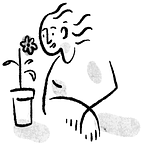Because of this paradox about the internet: that it can be both a thing of beauty and a dumpster fire, we all have to do our individual parts to make it more of the first description: a place of needed connection, education, encouragement, and personal and communal growth, and much, much less of the latter. There's more than one way we can do this, but this episode is about one specific idea.
Subscribe to Books & Crannies, Tsh’s newsletter
Order Tsh’s new book, Shadow & Light
Browse Tsh’s recommended books
Sign up for Tsh’s audio workshop, Create Your Rule of Life (pay what you want)
Who Tsh supports on Patreon: Annie Jones’ From the Front Porch, Beth & Sarah’s Pantsuit Politics, The Catholic Traveler, Dear Hank and John
Who Tsh supports on Substack: David French’s The Dispatch, Claire Diaz-Ortiz’s Newsletter, Knox McCoy's Sectional Healing, Amber Haines’ Story Letters, Seth Haines’ The Examined Life, Circe Institute’s Forma Journal, Hank Green’s Pay Attention, Nicole Bennett’s Book is the Watchword, Mark Galli’s Galli Report, Jeff Chu’s Notes From a Make-Believe Farmer, Stephanie Smith’s Slant Letter, Michael Wear’s Reclaiming Hope, Anna Cordrea-Rado’s The Professional Freelancer, Sarah Bessey’s Field Notes, Erin Moon’s The Swipe Up, and Caroline TeSelle’s I’ll Be Witty Tomorrow
The Repair Shop, on Netflix
Check out the fantastic shoes and bags available right now at Rothys.com/goodlist
This is The Good List — I’m Tsh Oxenreider.
This is an idea.
I don’t have to tell you that 2020 has been the wildest year of our lifetimes. We feel it in every area of our lives, from our parenting, to our work, to our travel (or lack thereof), to our faith practices, to our exercise and eating habits, to our relationships and communities, to our finances, to our overall emotional and mental well-beings and our ability to concentrate. I’d also include somewhere in this long list of ways 2020 has changed us, in both direct and indirect ways, how we use the internet.
I’m enormously grateful for it, and think I’d be going much crazier during this pandemic without it. I’m thankful that many of us have the ability to work and do school remotely, to order grocery pickup, to support local businesses with online ordering, and to find both information and entertainment that genuinely makes going through this global isolated event better — and all this is thanks to the technology of the internet.
The internet can also be a dumpster fire of noise, chaos, misinformation, bullying, FOMO, despair, anxiety, and isolation, and there’s no denying that. To do so would be to bury our heads in the sand, to say “No no, everything’s fine, just let me have my devices, thank you.” It’s both/and. The internet is a great tool of our modern age that connects us in important ways, and it’s a channel for despair when it’s used nefariously. It’s a neutral tool, like a brick: it can be used to build a house or break a window.
Because of this paradox about the internet, I am a big, big, BIG believer in doing my individual part to make the internet more of the first description: a place of needed connection, education, encouragement, and personal and communal growth, and much, much less of the latter.
There’s more than one way to do this. We can set up personal parameters that help us keep the bad stuff out and the good stuff in: things like ad blockers, time management software, browser extensions that take away the things that bother us, and other little hacks that keep us more focused when we enter the distracting world of the web. We can also speak out on our own spaces, big or small — we can, for example, use our social media accounts to encourage our friends and followers to be better neighbors, get out in nature, read good books, appreciate artistry, make people laugh, get offline, and generally be better humans. We can do the same (and I’d argue, even more) with our blogs, podcasts, video channels, and newsletters, if we have those things.
We can use those time management tools and apps to make sure we personally do the things we encourage others to do — and that is, spend more of our life offline than on. We can get online to do the things we both need to do and want to enjoy, and then get off to cook more, garden more, walk more, sleep more, talk more, and listen more. In doing this, we’re modeling the lives we want for others: for our children, our parents, our friends, our neighbors. We’re being the change we want to see in the world.
And there’s one other practical way we can make sure the internet is more of a tool for good than evil – and that’s to directly support the work done that makes it that place. I’m talking about literally supporting, individually, the work being done that helps you appreciate the internet more and helps you be more of the human you want to be.
Think of those podcasts, video channels, newsletters, news media outlets, services, and more that help you be a more informed citizen, a more educated adult, a less anxious parent, a better-read neighbor, and a better steward of the earth: and make sure those resources stay afloat.
2020 has been hard financially on so many of us, and that’s no small thing. That’s all the more reason why it’s essential that our hard-earned dollars go to the things we truly care about. Part of that looks like eliminating as many dollars as we can from the resources that either take away from, or at least don’t contribute to, the world we want to live in. And it also looks like redirecting those dollars to places we want to stick around.
Just like in our offline world, where it’s good to order takeout from our beloved neighborhood restaurants and coffee from our locally-owned cafes, it’s important to support online businesses and creators that do the things we say we care about.
I’ll share practically how this works in my own life in just a bit, right after I thank a sponsor (who’s all these things I’m talking about in this episode). I’ll be right back.
[AD BREAK]
Alright, so supporting our favorite online businesses and creators… Most of us know this is important, but how does it work, boots on the ground, especially when you’re on a budget? Well, obviously I can’t give you your best line-by-line item budget for supporting the things that matter to you, but I can illustrate for you how it works in my life. This isn’t to brag, nor tell you how to do it — it’s simply to give you a practical example of things you can translate for your own life.
First, I now buy books online from bookshop.org instead of Amazon. You already know this from episode 22 of The Good List, so I won’t rehash everything here, but to recap: books are hugely important to me, I’m not a fan of how Amazon is seemingly taking over everything (though I do admit it’s hard to make a clean break from them completely), so I can at least support local bookshops by shopping online at bookshop.org. And as someone with an online platform, I’m doing my best to promote books via bookshop.org as well — I’ve got a bookshop there full of my recommendations, and when you order from there, you’re both supporting local bookshops and supporting me as an indie creator, which is a win-win-win all around, I say.
Next, we have monthly subscriptions for entertainment venues we truly value as a family: this year, we subscribed to BritBox and watch it frequently to scratch our Anglophile itch. We’ve also bought and downloaded a few more movies than usual, since we’re not going to movie theaters and it’s only a few dollars more to just go ahead and buy it for our iTunes library instead of renting it. We’re very intentional about what we buy, out of support for good artistry. For example, not too long ago we bought A Hidden Life, Murder on the Orient Express, Knives Out, Interstellar, and The Sandlot instead of renting them — just because we want to do our small part in supporting the sort of films we want to keep being made.
Third, I support with my dollars the teachers and resources that support my lifelong continuing education. Instead of just buying the next course or bundle of resources that happen to be on sale, and then never use them, I intentionally set aside some of our budget to pay for the things that support us as a family who learns. The specifics change, but right now as I’m recording this, I’m currently paying for a storytelling course and membership that genuinely makes me a better writer, a membership filled with courses for classical education, which further trains me in my work as an English teacher, an at-home fitness program called MommaStrong, and Word on Fire Institute as part of my faith formation. My oldest teen is also taking an online course as part of her homeschool. These resources and creators genuinely make our life better, and I want to make sure they stay around — the only real way I can do that is by putting my money where my mouth is. Instead of just enjoying their free podcasts or online forums or social media accounts, I further support their work by becoming members of their services, which, in turn, gives me much, much more in return.
Fourth, I support the journalism that I feel is good and SO necessary right now. This means we pay for The Atlantic, our local NPR station, The New York Times, and AllSides.
And finally, and arguably most importantly, I support indie creators who are literally doing the work I want to see out on the internet and in the world. The two places this happens the most is on Patreon and Substack, which are similar in some ways, in that they’re platforms that allow fans and followers to directly support the creators they love. Patreon tends to be a little more about thanking a supporter in exchange for extras, while Substack is more for writers who want to go deeper with the people who truly value their work by sharing more in-depth writing in a subscribers-only space. To me, it feels more like the way blogging used to be 10-12 years ago. These are generalities, of course, but this is the gist of both of these spaces.
My subscriptions in these arenas have changed over the years, but here’s how it looks for me personally right now: On Patreon, I’m currently supporting the podcast From the Front Porch, from Annie B. Jones, the owner of The Bookshelf in Thomasville, Georgia. I’ve never been to her shop personally (though it’s high on my to-do list in my travels), but I love her and the work she’s putting out in the world, so it’s worth it for me to be one of her monthly patrons. I’m also a patron of Beth & Sarah of Pantsuit Politics because I truly believe their work is so, so important right now. I’m a patron of The Catholic Traveler, because I love the beauty he’s added to my life, and I’ve learned so much from him as a travel guide and resident of Rome. I want him to keep doing what he does, and this is my small way of making sure he can. And lastly, I’m currently a patron of Dear Hank and John, because I just love the Green brothers (our whole family does), and I want more work like theirs out on the internet. That doesn’t just happen with wishful thinking.
On the Substack side of things, I subscribe to many newsletters from writers there, both free and paid, because I truly believe supporting independent writers of all sorts is hugely important in our culture’s current climate. We’re so used to finding stuff for free on the internet that it’s easy to forget how much more we take than we give, and good words don’t just happen. If we want to see more truth in journalism, better stories told by more people than those who have huge platforms, and more thoughtful reflections from folks whose perspectives we’re grateful for, we HAVE to be the ones who help make it happen. I’m serious about this. So for me, personally, this means I subscribe to David French’s The Dispatch (just link to The French Press), Claire Diaz-Ortiz’s Newsletter, Knox McCoy's Sectional Healing, Amber Haines’ Story Letters, Seth Haines’ The Examined Life, Circe Institute’s Forma Journal, Hank Green’s Pay Attention, Nicole Bennett’s Book is the Watchword, Mark Galli’s Galli Report, Jeff Chu’s Notes From a Make-Believe Farmer, Stephanie Smith’s Slant Letter, Michael Wear’s Reclaiming Hope, Anna Cordrea-Rado’s The Professional Freelancer, Sarah Bessey’s Field Notes, Erin Moon’s The Swipe Up, and Caroline TeSelle’s I’ll Be Witty Tomorrow. I’m saying this only to show to you how much good work is out there, and that we’re invited to be a part of it. The cherry on top is that I also love Substack as a company — I’ve been on the phone a few times with the founders and they’re genuinely great people who care deeply about the internet being a good place for all of us.
You probably already know that I also have a Substack newsletter called Books & Crannies, and if any of my work has meant anything to you over the years — from my podcasts to The Art of Simple, to my books, to 5 Quick Things, heck, to even my Spotify playlists — becoming a subscriber is a HUGE way you can vote with your dollars for the kind of place you want the internet to be. As ad structures and systems constantly change on the internet, all the time but especially in 2020, supporting your favorite writers and other creators directly is probably the most important way you can help them do the work you largely enjoy for free. I promise, you get so much more than you give, and it sounds corny, but it truly is a joy to become a true supporter of your favorite creators. As an antidote to despair in 2020, give it a try if you haven’t yet.
[LISTENER COMMENT]
Hi Tsh, this is Amanda McClendon from Houston, Texas. There is a show on Netflix called "The Repair Shop" and I think it was originally aired on the BBC. So anyway, it takes place in an actual repair shop in the countryside in England. It's a group of people who are just really, really good at fixing things and people will bring in antiques and it's not like Antiques Roadshow where they're evaluating the value of the thing. Most often, it's just people bringing in family heirlooms that they've had in their family for like three hundred years or something like that, but maybe not three hundred years, but you get what I mean. A guy brought in his windup toys from "Doctor Who" from the 70s, people bring in their stuffed animals, and these people just lovingly restore them back to back to life, and it's really, really chill and it's hyper-competent people with British accents just doing really good work. Anyway, I think you would really like it. I hope you're having a good day. Bye.
Thanks to listener Amanda for sharing with us what’s on her good list. All those people I said I personally subscribed to? Even though my point in this episode is more the idea of directly supporting creators and not what I specifically subscribe to, if you’re curious you can find links to their spaces in the show notes of this episode #46. A few reminders that my latest book, Shadow & Light: A Journey Into Advent, is officially out in the world, and you can also find that at your favorite bookstore or in the links of the show notes of this episode, and also that you can subscribe to my newsletter, Books & Crannies, also using the link in the show notes.
One more thing — I’d like to learn about you! Please fill out the short, super-easy listener survey that helps me improve my future work as a podcaster. As a thank you, I’ll randomly draw one of your names and send you a box of some of my favorite things! Find the link in the show notes of this episode, or go to thegoodlistshow.com/survey. And thank you in advance.
Music for the show is by Kevin MacLeod, and thanks, as always, to Caroline TeSelle and Kyle Oxenreider for their help, as well as my furry intern, Ginny. I’m Tsh Oxenreider, and I’ll be back with you soon — thanks for listening to The Good List.










Love Your Creators